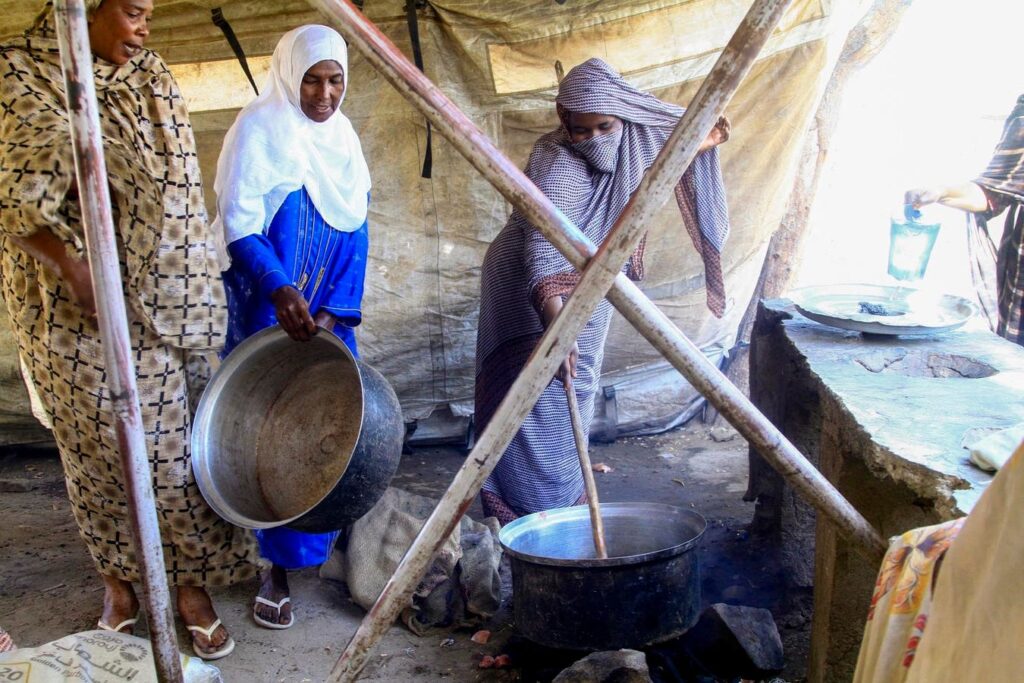Sudanese women cook at a camp for displaced people, in Port Sudan, on April 15, 2025. Sudan entered … More
AFP via Getty ImagesAs the war in Sudan entered its third year, the country is facing the biggest humanitarian crisis in the world today. Nonetheless, the situation receives very little attention globally. Having returned from Chad, where he met with Sudanese refugees, Filippo Grandi, UN High Commissioner for Refugees, commented: “Sudan is bleeding. Its people have been suffering for too long. Civilians are being bombed every day. Millions are trapped between conflict, neglect and the dilemma of flight. Two years of war have created what is now the world’s worst humanitarian and displacement crisis, intensified by extreme cuts to international aid. In the past few days, we have seen brutal attacks on vulnerable people in North Darfur. Aid workers were among those killed. These are flagrant violations of humanitarian law.” He further added: “The Sudanese are besieged on all sides – war, widespread abuses, indignity, hunger and other hardships. And they face indifference from the outside world, which for the past two years has shown scant interest in bringing peace to Sudan or relief to its neighbors.”
The last two years have brought unimaginable pain and suffering to the people in Sudan. The conflict has forced 12.4 million people to flee their homes and seek safety either elsewhere in Sudan or across the border, including more than half of whom are children (including nearly a third under five). About 90% of children are out of school.
Children are among those most severely affected by the war. The number of children in need of humanitarian assistance in the country doubled. The UN Children’s Fund (UNICEF) reports that 15 million children require support, up from 7.8 million at the start of 2023, the year fighting erupted between the Sudanese Armed Forces (SAF) and former ally the Rapid Support Forces (RSF). Sudan is currently the world’s largest humanitarian and child displacement crisis, with more than 30 million people overall needing humanitarian assistance this year.
Famine is spreading at an alarming rate. The UN World Food Program (WFP) has now confirmed famine in 10 locations, with more places at risk. The agency recalled that between 2022 and 2024, around 60% of annual admissions for severe acute malnutrition occurred during the rainy season, meaning that up to 462,000 children could be affected this year if the trend holds.
With the ever-deteriorating situation, humanitarian access to children in Sudan is closing due to the intensity of the conflict and bureaucratic impediments. Funding for life-saving services is critically low.
Disease outbreaks are also expected to surge, while vaccination rates are dropping. Last year, 49,000 cholera cases and more than 11,000 cases of dengue fever were reported, mainly affecting mothers and children. Such outbreaks are further exacerbated by the effects of the rainy season, including water contamination, poor sanitation, and increased displacement and population movement.
However, famine and disease are not the only threats to the children in Sudan. As reported by UNICEF, “The situation is being compounded by a deadly combination of interlinked factors, such as a ten-fold surge in the number of grave violations against children, namely killing and maiming; abduction; recruitment and use in hostilities; rape and other forms of sexual violence; attacks on schools and hospitals; and the denial of humanitarian access.” While grave human rights violations were previously confined to regions such as Darfur, Blue Nile and South Kordofan, such violations have now been verified in more than half of Sudan’s 18 states. The reported violations against the people of Sudan meet the legal definitions of war crimes and crimes against humanity. In the case of Darfur, where whole communities are targeted because of their ethnicity, the question of genocide has been raised. All these crimes must be investigated and those responsible brought to justice.
The situation in Sudan requires urgent action to stop the conflict and provide comprehensive assistance to all those affected. Without these steps, the people of Sudan do not stand a chance. In the words of the UN High Commissioner for Refugees, Filippo Grandi, “Continuing to look away will have catastrophic consequences.”
Read the full article here


